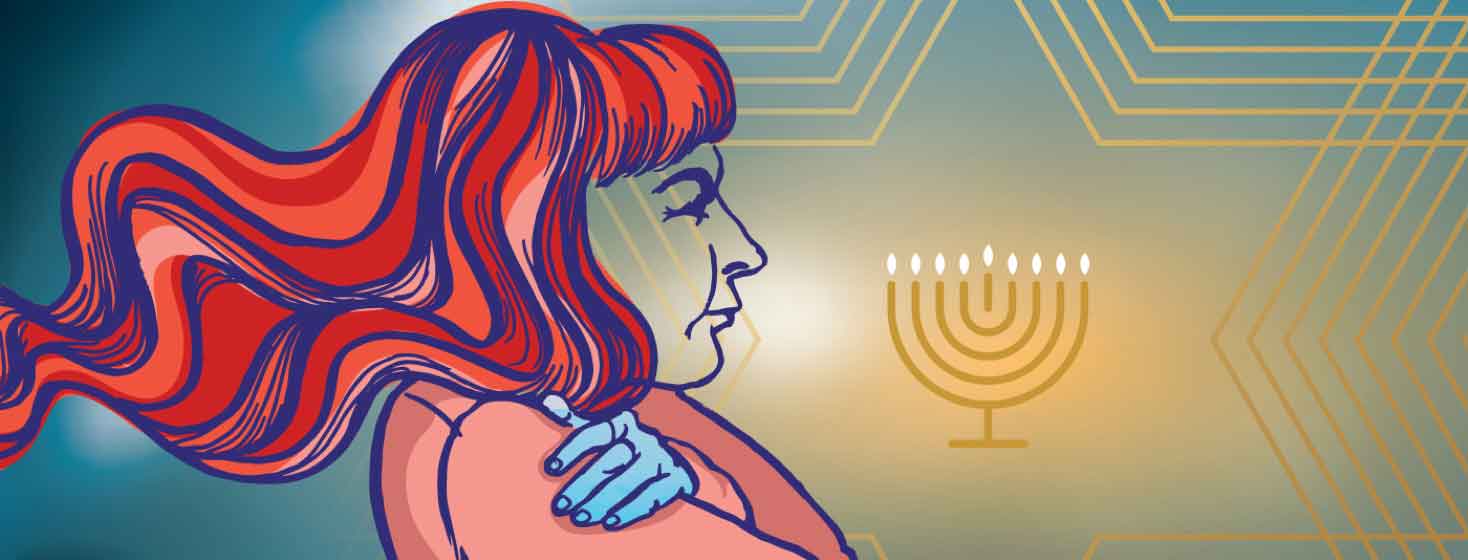How Endo Helped Me Appreciate Hanukkah
A couple of years ago, I decided to convert to Judaism. As I learned more about the faith, I remained confused by Hanukkah.
I understood that the holiday symbolizes endurance and light in the darkest seasons. Yet I did not resonate with Hanukkah as much as I did with some of the other holidays.
However, as my endometriosis symptoms worsened, I gained new insight (and appreciation) for Hanukkah.
What is Hanukkah?
Over eight days, Jewish people light candles, pray, give gifts, and eat yummy fried foods. The general mood of Hanukkah is celebratory. Some might be surprised to learn that the winter festival of lights has roots in imperialistic history.
In 165 BC, a group of guerrilla fighters successfully reclaimed the Temple. Antiochus Epiphanes IV, a ruler from the Seleucid Empire, ramped up his efforts to solidify his control over his territory.
Part of this empire included Judea. Judea was rooted in Jewish culture, a problem for Antiochus Epiphanes IV. The emperor wanted his subjects to conform to his Hellenistic beliefs and background.
Antiochus Epiphanes IV outlawed Jewish practices like reading the Torah and putting an altar for Zeus in the Temple. Even when threatened with death, a priest and his sons refused to comply.
This family, the Maccabees, fought against the larger Syrian army. Finally, this rebellion (called the Maccabean Revolt) successfully reclaimed the Temple.
Resting and strategizing when the odds are stacked against you
I'm not trying to equate my health struggles with an important sociopolitical conflict. My battle against endometriosis is different from my ancestors' fight against genocide.
However, Hanukkah is meant to provide illumination in dark times. The light of Hanukkah is symbolic; while most of us are not waging war against a conquering emperor, we can all find hope and warmth to inspire us to continue fighting our own battles, even if those everyday obstacles seem trivial in comparison to Hanukkah's military origins.
So, how did endo help me better appreciate this contemporary spirit of Hanukkah?
When the Maccabees first refused to reject their faith, they fled into the wilderness. To survive, they needed to find a safe place in the caves or mountains to reflect on their situation. Before the Maccabees could fight against their oppressors, they had to lay low.
With endometriosis, I always feel like I'm waging an unwinnable war. After all, endo is a chronic condition that has no cure. How can I win if I'm fighting against my own body?
But Hanukkah taught me there's no shame in retreating and resting to preserve my strength. While I might wish I could buckle down and overpower all of my flare-ups, I know that I can better handle my symptoms if I rest when I am fatigued.
Fighting endometriosis is long, so I need to count my wins. The Maccabees staged proactive, surprise attacks: retreating to their wilderness hideout after they struck.
Over time, these smaller battles made a big impact and helped the Maccabees succeed against a larger opponent. In my own way, I have to take smaller steps and routinely fight against my illness.
Each doctor's visit, pain relief strategy and positive coping mechanism I use can help me loosen the chokehold that chronic illness can have on my life.
When I feel like endometriosis is too mighty of an opponent to face, I can rest and reflect before getting up to fight another day.
Building a supportive community
One thing I love most about Hanukkah is that we light candles with other people. Hanukkah encourages us to cultivate community during the darkest time of the year.
If we're alone, we may struggle to stay warm and fight light during the long nights of winter. But we can thrive during winter when we can lean on each other.
Alone, the Maccabees could not have succeeded against the Seleucid Empire. They recruited a group of dedicated people to join their resistance.
No matter the battle we're fighting in our lives, we can find strength in numbers. When I first began my journey with endo, I felt overwhelmed and isolated by my symptoms. Over time, I trusted loved ones to help me.
I have a supportive community of friends who can advocate for me when I attend medical appointments or need help running errands. With these allies in my corner, my fight against endo feels much less daunting.
Finding joy to celebrate your wins
Because Hanukkah memorializes a revolt, some people might expect the holiday to feel somber. However, Hanukkah is one of the more joyous Jewish holidays.
Why? When the Maccabees took back the Temple, they knew they still had a big task: cleaning and rededicating the holy site. After years of fighting, the Maccabees lacked the tools to restore the Temple to its previous splendor.
As the fighters assessed the damage in the Temple, they found one jug of oil. They expected the oil to light their lamps for one day. However, this oil lasted for eight days.
With a chronic illness, I often feel wrung dry. I feel fatigued, and I know that I cannot always complete the tasks on my to-do list in a timely manner.
When I have flare-ups, I have to ask my family and friends for rain checks. I have to ask my boss for deadline extensions or breaks from work. Then, I have to use the little energy I have to make it through the day.
Often, though, I surprise myself. My body and mind have hidden stores of endurance that allow me to accomplish more than I could have dreamed possible. Yes, my body has its limits, which continue to frustrate me.
After my period each month, my body feels stripped raw from inflammation. But then, day by day, my body heals itself.
Like the Maccabees' resourceful use of their lamp oil, I have learned to surprise myself with my persistence.

Join the conversation